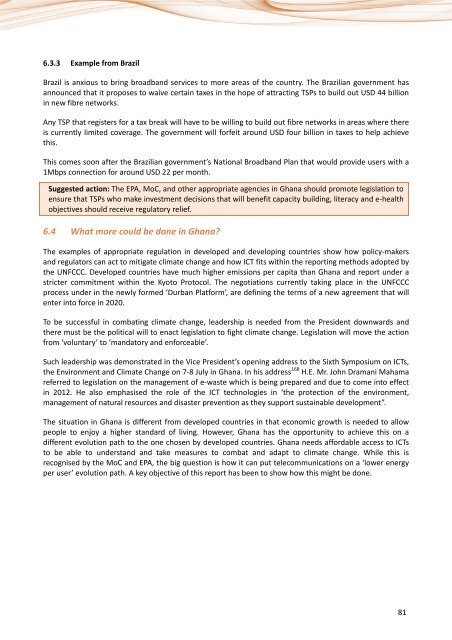Information and communication technologies (ICTs) and ... - ITU
Information and communication technologies (ICTs) and ... - ITU
Information and communication technologies (ICTs) and ... - ITU
Create successful ePaper yourself
Turn your PDF publications into a flip-book with our unique Google optimized e-Paper software.
6.3.3 Example from Brazil<br />
Brazil is anxious to bring broadb<strong>and</strong> services to more areas of the country. The Brazilian government has<br />
announced that it proposes to waive certain taxes in the hope of attracting TSPs to build out USD 44 billion<br />
in new fibre networks.<br />
Any TSP that registers for a tax break will have to be willing to build out fibre networks in areas where there<br />
is currently limited coverage. The government will forfeit around USD four billion in taxes to help achieve<br />
this.<br />
This comes soon after the Brazilian government’s National Broadb<strong>and</strong> Plan that would provide users with a<br />
1Mbps connection for around USD 22 per month.<br />
Suggested action: The EPA, MoC, <strong>and</strong> other appropriate agencies in Ghana should promote legislation to<br />
ensure that TSPs who make investment decisions that will benefit capacity building, literacy <strong>and</strong> e-health<br />
objectives should receive regulatory relief.<br />
6.4 What more could be done in Ghana?<br />
The examples of appropriate regulation in developed <strong>and</strong> developing countries show how policy-makers<br />
<strong>and</strong> regulators can act to mitigate climate change <strong>and</strong> how ICT fits within the reporting methods adopted by<br />
the UNFCCC. Developed countries have much higher emissions per capita than Ghana <strong>and</strong> report under a<br />
stricter commitment within the Kyoto Protocol. The negotiations currently taking place in the UNFCCC<br />
process under in the newly formed ‘Durban Platform’, are defining the terms of a new agreement that will<br />
enter into force in 2020.<br />
To be successful in combating climate change, leadership is needed from the President downwards <strong>and</strong><br />
there must be the political will to enact legislation to fight climate change. Legislation will move the action<br />
from ‘voluntary’ to ‘m<strong>and</strong>atory <strong>and</strong> enforceable’.<br />
Such leadership was demonstrated in the Vice President’s opening address to the Sixth Symposium on <strong>ICTs</strong>,<br />
the Environment <strong>and</strong> Climate Change on 7-8 July in Ghana. In his address 168 H.E. Mr. John Dramani Mahama<br />
referred to legislation on the management of e-waste which is being prepared <strong>and</strong> due to come into effect<br />
in 2012. He also emphasised the role of the ICT <strong>technologies</strong> in ‘the protection of the environment,<br />
management of natural resources <strong>and</strong> disaster prevention as they support sustainable development”.<br />
The situation in Ghana is different from developed countries in that economic growth is needed to allow<br />
people to enjoy a higher st<strong>and</strong>ard of living. However, Ghana has the opportunity to achieve this on a<br />
different evolution path to the one chosen by developed countries. Ghana needs affordable access to <strong>ICTs</strong><br />
to be able to underst<strong>and</strong> <strong>and</strong> take measures to combat <strong>and</strong> adapt to climate change. While this is<br />
recognised by the MoC <strong>and</strong> EPA, the big question is how it can put tele<strong>communication</strong>s on a ‘lower energy<br />
per user’ evolution path. A key objective of this report has been to show how this might be done.<br />
81

















